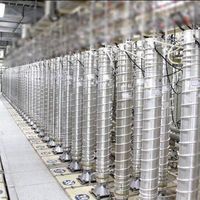Syria Owes $50 Billion To Iran, Leaked Document Reveals
Syria owes Iran $50 billion according to leaked documents from Iran’s Foreign Ministry, with fears for Assad’s possible assassination creating fear in Tehran the money may never be recouped.
The revelations came after the hacktivist group ‘Uprising till Overthrow', affiliated with the Albania-based opposition Mujahideen-e Khalq (MEK) group, hacked the Islamic Republic’s Foreign Ministry servers, disabling 210 sites and online services and leaking a large batch of documents.
Minutes from a meeting of Iran’s Supreme National Security Council show Syria’s debt goes back to a long-term agreement signed between the two countries in January 2019, under former president Hassan Rouhani. However, the debt has been building for much longer, with roughly $11bn worth of oil given to Damascus from 2012 to 2021.
A combination of aid in the form of military support and cash, the total amount of debt to Iran is estimated to be about $50 billion, though the document said the final amount is still being calculated.
In the first six months of the Iranian year 1400 (from March 2021 to September 2021), when President Ebrahim Raisi was in office, one million barrels of oil were sent to Syria but the Syrians allegedly demanded two million barrels per month.
The commander-in-chief of Iran’s Revolutionary Guards Hossein Salami proposed a 1.5 million barrel export for the second half of the year upon the suggestion by Esmail Qaani, commander of IRGC’s Quds Force — a division primarily responsible for extraterritorial military and clandestine operations, read the document.
One of the paragraphs of the document referred to Supreme Leader Ali Khamenei’s urgency to cash in on Syria’s debts, fearing a repeat of its investment in Bosnia and Herzegovina.
One of the first Muslim countries to provide support for the Bosnian Muslims in the Bosnian War (1992–95), the IRGC sent more than five thousand tons of arms to the Bosnian Muslims. In spite of massive investment, Tehran's leverage in Bosnia and Herzegovina has decreased significantly, proving a poor asset for the regime.
The document stressed the necessity of having all terms agreed by the two nations’ parliaments to prevent “Iran’s expulsion from Syria under any circumstances” as may happen if Iran’s proxy leader, President Bashar al-Assad, should be assassinated, a concern raised in the documentation.
It stated that the new term of Assad is sensitive and could lead to his elimination, urging that if the document is not finalized soon, "billions of dollars of Iran’s assets will be put in serious danger”. Syria is a key strategic asset for Iran as it wields power through its proxies across the region.
The extent of Iranian military expenditures and financial aid to Syria to keep Assad in power is unknown but is believed to have run into billions of dollars at the expense of the Iranian people.
But Syria is in the midst of a massive regional power-shift, causing concern to Tehran. In the last month, Assad and his aides have met with key figures in countries including the UAE and Turkey as several regional powers see the benefits of bringing Assad, one of Iran's regional puppets, in from the cold, in a bid to lure him away from Tehran’s destabilizing influence.
Last week, Syria was also readmitted to the Arab League after more than a decade in isolation, though Qatar said it would not resume diplomatic ties with Syria until its domestic crisis is resolved.
Iranian parliament member, Heshmatollah Falahatpisheh, announced in May 2020 that the country had invested $30 billion in Syria and must recoup it. With reconstruction costs estimated at $250-$400 billion, Syria urgently needs to improve economic ties with regional countries.
Most recently, Iran has been using the earthquake disaster to smuggle weapons and military equipment into Syria to arm its regional proxies within shipments marked as humanitarian aid.
It is not the first time the ‘Uprising till Overthrow' succeeded in hacking and deactivating several regime websites and services. In June 2022, it hacked over 5,000 security cameras of state bodies and 150 websites belonging to Tehran Municipality, displaying anti-regime slogans on the websites and releasing internal data.








